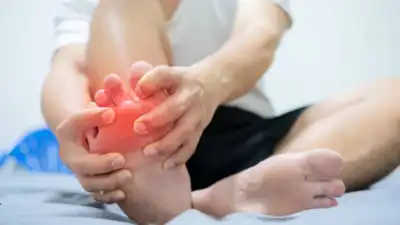So there you are—fast asleep, maybe even dreaming of your next beach vacation—and bam, you’re jolted awake by a sudden pain in your big toe. It’s hot, it’s swollen, and it feels like someone slammed it with a hammer. Weird, right? Welcome to one of the strangest and most uncomfortable ways your body tries to tell you something: your uric acid might be running wild.
This mysterious middle-of-the-night pain isn’t just random. It’s often an early warning sign of high uric acid, and in many cases, it points directly to gout—a form of arthritis caused by uric acid crystals building up in the joints. And oddly enough, these flare-ups seem to love showing up during the night.
Why night? Your body’s night mode might be fueling the fire
It turns out, your body behaves quite differently while you’re sleeping. For one, your core temperature drops slightly during the night. That cooling effect can actually help uric acid crystallize more easily, especially in the extremities like toes, ankles, or fingers. Since your circulation slows down while you’re resting, those little crystals can settle into joints and tissues with much less resistance.
Also, you’re not drinking water when you sleep—obviously—so your body tends to get a little dehydrated by the early morning hours. Dehydration thickens your blood and concentrates the uric acid, making it more likely to crystallize. It’s a perfect storm: cold, concentrated, and immobile—just the way gout likes it.
have found that “the risk of gout attacks during the night and early morning is 2.4 times higher than in the daytime.” A report from Mayo Clinic also says that an attack of gout can happen in the middle of the night.
But, it’s not a set rule—some people get hit in the morning or even during the day. The timing really depends on your hydration, diet, lifestyle, and how your body handles uric acid buildup overall.
What the pain feels like (hint: it’s not subtle)
The pain isn’t a dull ache you can ignore. It’s sharp, fiery, and often unbearable, especially in the big toe—though it can also hit the ankles, knees, or even the wrists. People often describe it as their toe being “on fire” or like “glass shards inside the joint.” And once it wakes you up, good luck falling back asleep.
Even more frustrating? The skin around the joint can become red and tight, and the area might stay sore for days. You might limp your way through the morning wondering what on earth you did to deserve it.
Uric acid is the reason
Uric acid is formed when your body breaks down purines—natural substances found in many foods and drinks. Normally, uric acid dissolves in the blood and exits through urine. But when there’s too much of it, or if your kidneys can’t eliminate it effectively, the excess starts crystallizing inside joints. That’s where the real trouble begins.
Red meat, seafood, beer, sugary sodas, and even certain veggies like spinach and mushrooms are high in purines. Add poor hydration, crash dieting, or too much alcohol into the mix and—boom—you’ve just handed uric acid the keys to your joint.
Why ignoring it can backfire
Many people brush off occasional gout pain or chalk it up to sleeping in a weird position. But repeated flare-ups are your body waving a red flag. Over time, untreated high uric acid can lead to chronic gout, joint damage, kidney stones, and even kidney disease. What starts as a middle-of-the-night toe tantrum can become a long-term health issue.
So if this is happening more than once, don’t just grab the ice pack and go back to bed. It might be time for a chat with your doctor—and a closer look at your diet and lifestyle.
Can you prevent it?
Absolutely. The key is to keep your uric acid levels in check. Staying hydrated during the day (and especially before bedtime) can help your kidneys flush out excess uric acid. Avoiding purine-rich foods at dinner, cutting down on alcohol, and maintaining a healthy weight can all play a role in lowering the risk of nocturnal flare-ups.
And yes, medications like allopurinol or febuxostat can also help long-term sufferers manage their levels more effectively—but they should always be taken under medical supervision.
When your body talks at night, listen
The body has a weird way of talking to us, and sometimes it chooses the worst possible hour to start yelling. But that stabbing toe pain at 2 a.m.? It’s not random. It’s often your body’s SOS about a uric acid imbalance that needs addressing.
